Joni Mitchell - Barangril
The scene Joni presents is one of striking simplicity and camaraderie, centered around the image of "Three waitresses all wearing / Black diamond earrings / Talking about zombies / And Singapore slings."
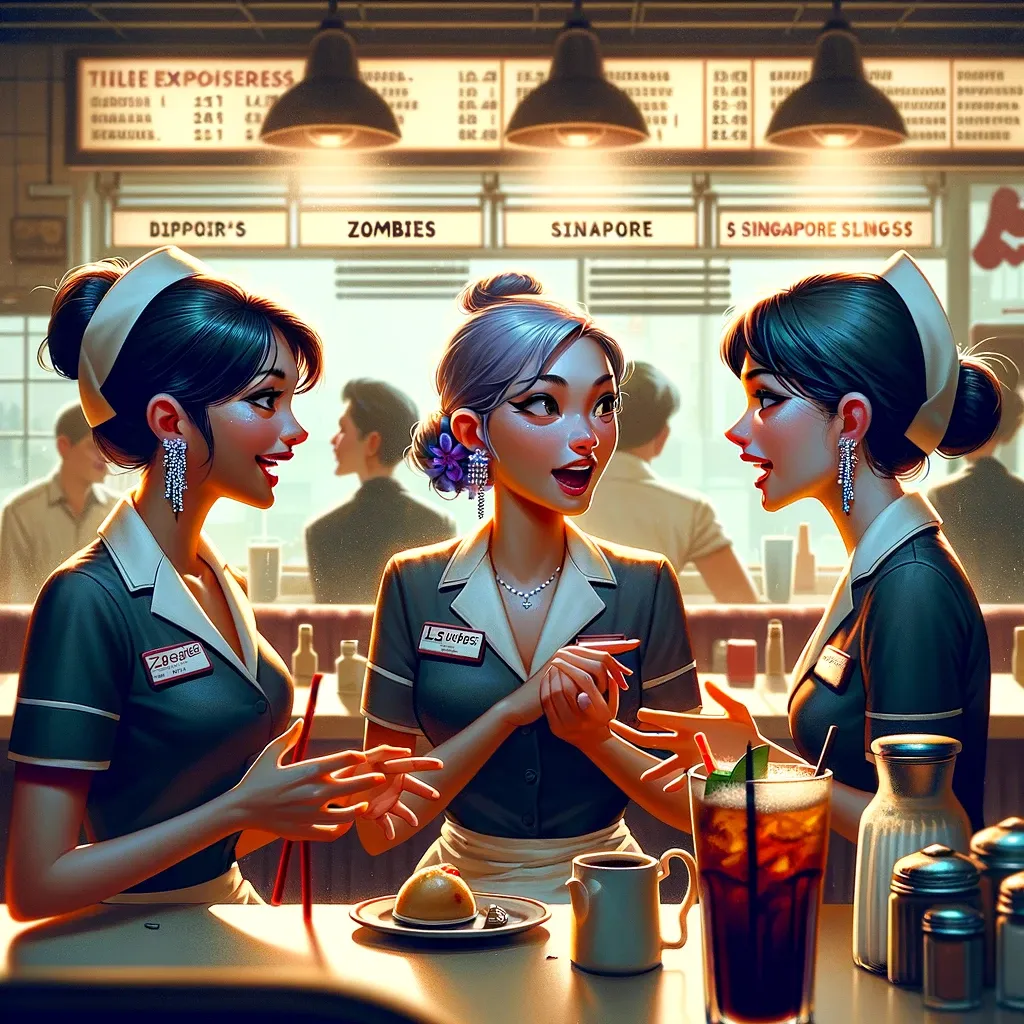
The scene Joni presents is one of striking simplicity and camaraderie, centered around the image of "Three waitresses all wearing / Black diamond earrings / Talking about zombies / And Singapore slings." This snapshot, full of life and conversation, stands as a testament to Joni's growth as a storyteller. The details she chooses to highlight – the black diamond earrings, the talk of zombies and exotic cocktails – create a sense of intimacy and shared experience, inviting the listener to step into the moment and feel the warmth of the connection between these women.

There's a lightness to this scene, a sense of ease and absence of trouble that belies the deeper bonds forged in these moments of casual exchange. By focusing on the simple pleasure of conversation and companionship, Joni celebrates the beauty and significance of these everyday interactions. Moreover, this shift towards impressionistic vignettes allows Joni to explore the rich tapestry of life, moving beyond the confines of her own experience to capture the diversity and complexity of the world around her. In doing so, she becomes a conduit for stories that resonate on a universal level.
Through this evolution in her storytelling, Joni invites us to find beauty and meaning in the ordinary moments that comprise our lives. She encourages us to look beyond our own personal narratives and appreciate the extraordinary nature of the mundane, the magic that can be found in the simple act of sharing a story or a laugh with others. Her journey from introspective singer-songwriter to masterful storyteller is a powerful one.
In this evocative snapshot, Joni Mitchell showcases her growth as a storyteller by capturing a moment that is both vivid and rich in imagery. The introduction of the "Three waitresses all wearing / Black diamond earrings / Talking about zombies / And Singapore slings" is a testament to her evolved approach to songwriting, where she steps back from the intensely personal and instead focuses on crafting a scene that is alive with conversation and camaraderie.
The waitresses, adorned with black diamond earrings, serve as a symbol of the working class – women who lead simple lives and find joy in the more down-to-earth pleasures of life. Their conversation, which revolves around the fantastical (zombies) and the exotic (Singapore slings), is a light-hearted escape from the complexities and drudgery of their daily routines. Joni's portrayal of these women is not one of judgment or condescension; rather, she finds their lifestyle appealing in contrast to the more ethereal existence of a music idol.
The sense of ease and absence of trouble among the waitresses hints at the deeper connections shared in these moments of casual exchange. Despite the mundane nature of their work, they have found a way to bond over shared interests and experiences, creating a sense of camaraderie that transcends their individual struggles.
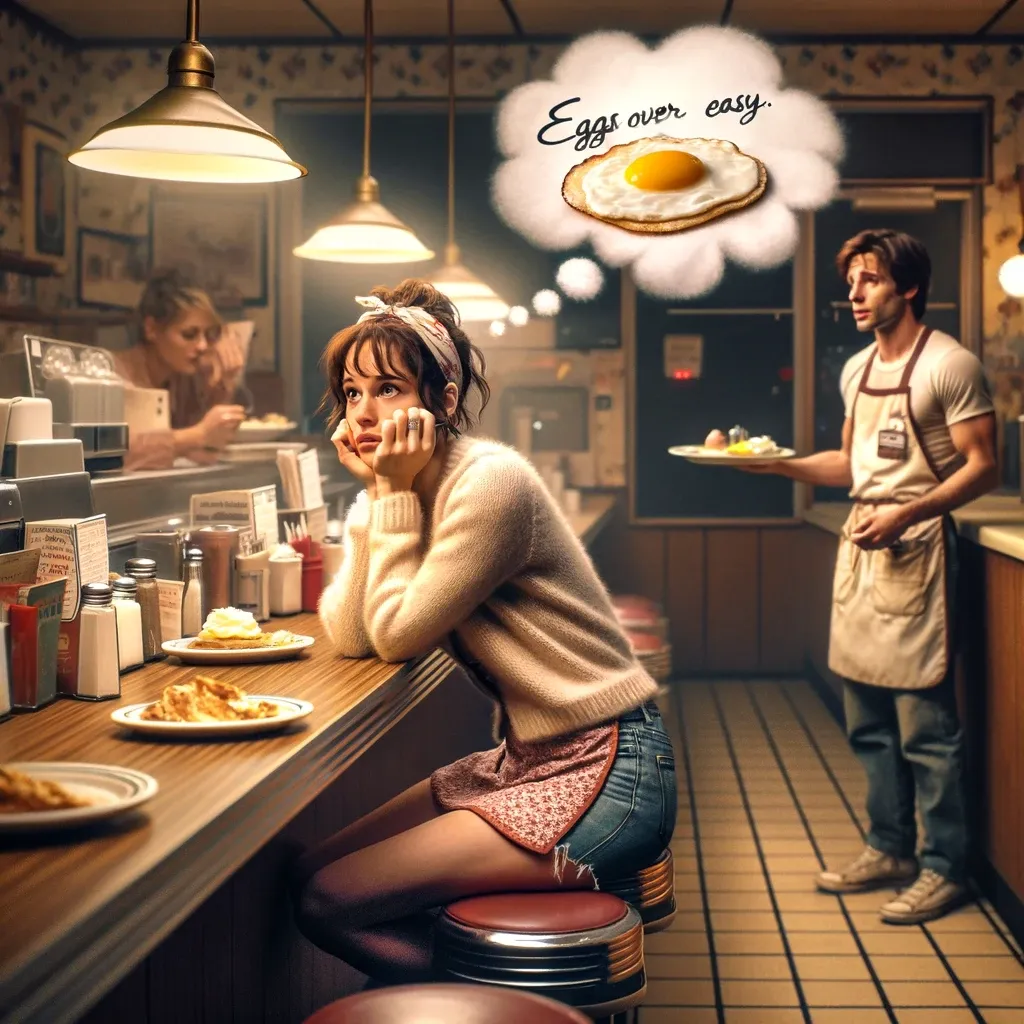
Joni's attempt to engage with the waitresses is met with indifference, as one of them is preoccupied with thoughts of her boyfriend and "eggs over easy." This small detail adds depth to the scene, highlighting the waitress's priorities and the simple pleasures that bring her comfort. Similarly, the truck driver's inability to provide information because he is "just a slave to Barangrill" underscores the idea that these working-class individuals are caught up in their own routines and responsibilities, leaving little room for distractions or diversions.
It is in this moment of disconnection that Joni experiences an epiphany: the simple pleasures she seeks can be found in the everyday lives of those around her, particularly in the way they cope with the challenges of working for a living. By finding joy in the rare opportunities to have fun and escape the daily grind, these individuals embody a resilience and appreciation for life that Joni finds inspiring.
The reference to "Barangrill" serves as a symbol of the mundane yet comforting routines that shape the lives of the working class. While a late-night drive to a gas station in L.A. may not qualify as a profound journey in the traditional sense, it represents a small escape from the demands of everyday life – a chance to break free from the usual patterns and find moments of respite and reflection.
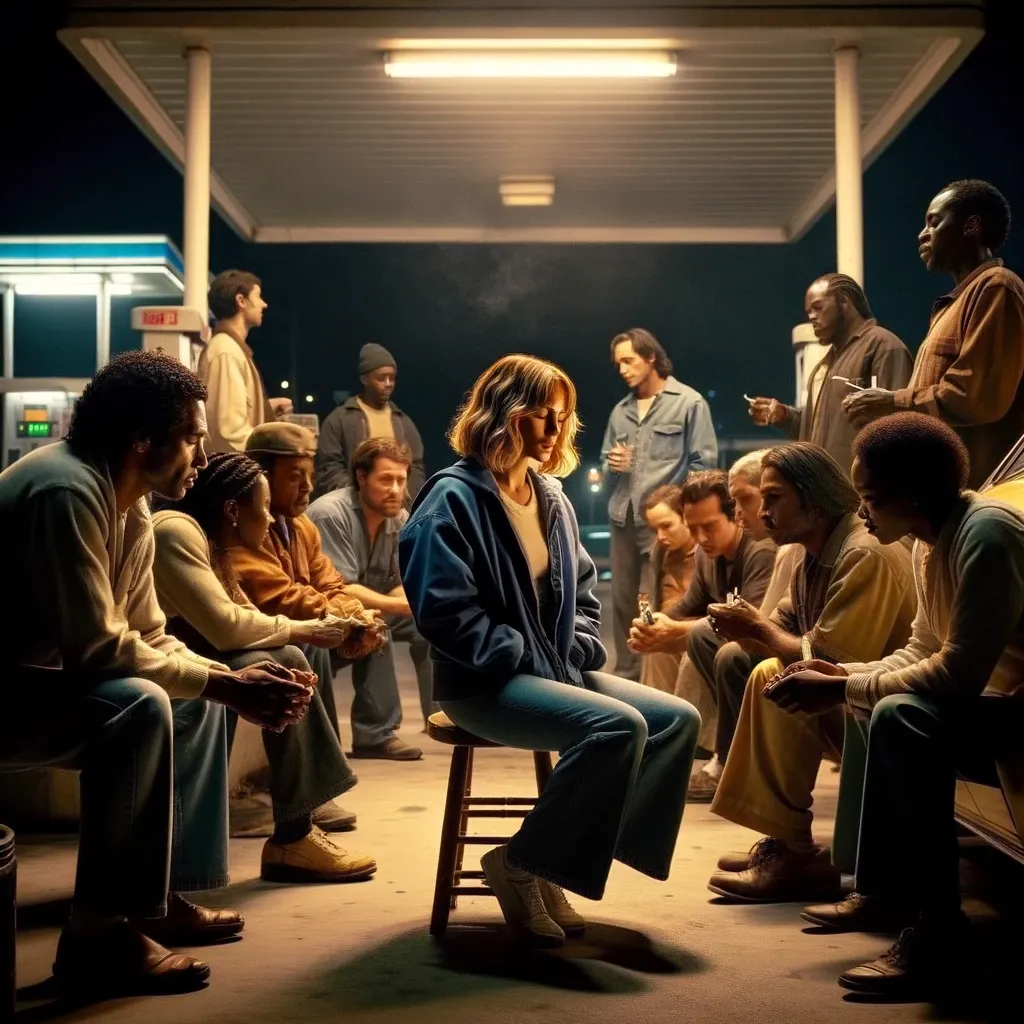
In this way, the song anticipates the themes of travel and self-discovery that would later be explored more fully in Joni's Hejira. The first two verses, which she initially wrote as a "spoof on the Trinity" centered around the three waitresses, take on new meaning when juxtaposed with the final verse inspired by her gas station epiphany.
Through this snapshot of working-class life, Joni Mitchell invites us to find beauty and meaning in the small, often overlooked moments that comprise our daily existence. She encourages us to look beyond the surface and appreciate the depth of human connection and resilience that can be found in even the most mundane settings. By celebrating the simple pleasures and coping mechanisms of those who toil through the challenges of everyday life, Joni's storytelling serves as a reminder of the inherent value and dignity of all human experiences, regardless of social status or occupation.
In these lyrics, Joni Mitchell delves into the profound peace that can be found in simplicity and the clarity of choice. The lines "Not one anxious voice / None of the crazy you get / From too much choice" highlight the tranquility that arises when we are not burdened by an overwhelming array of options. In a world where we are constantly bombarded with choices, from the trivial to the life-altering, the absence of this anxiety is presented as a rare and precious gift.
The idea of "too much choice" is a poignant commentary on the paradox of modern life. While having a multitude of options can be empowering, it can also lead to a state of decision paralysis, where the fear of making the wrong choice can be crippling. In this context, the lyrics suggest that there is a certain freedom and peace that comes from having a limited set of options, allowing us to move forward with confidence and purpose.
The vivid imagery of "The thumb and the satchel / Or the rented Rolls-Royce" presents a striking contrast between two very different modes of travel and, by extension, two different approaches to life. The "thumb and the satchel" evoke the image of a humble hitchhiker, carrying their belongings in a simple bag, relying on the kindness of strangers to navigate their journey. This represents a life of spontaneity, adventure, and trust in the unknown, where the journey itself is the destination.
On the other hand, the "rented Rolls-Royce" symbolizes luxury, comfort, and a more deliberate, planned approach to travel. It suggests a life of material abundance, where the destination is prioritized over the journey, and where the focus is on arriving in style and comfort.

Yet, despite the stark contrast between these two modes of travel, the lyrics suggest that both carry their own unique set of experiences and lessons. The hitchhiker's journey may be filled with uncertainty and discomfort, but it also offers the opportunity for serendipitous encounters, personal growth, and a deeper connection to the world around them. The Rolls-Royce journey, while offering a more controlled and predictable experience, may also provide a sense of accomplishment, status, and the opportunity to enjoy life's finer pleasures.
At its core, this song is a meditation on the choices we make and the paths we take in life. It reminds us that amidst the cacophony of voices and options that surround us, there is a quiet beauty in choosing a path that resonates with our authentic selves. Whether we choose the road less traveled or the highway of success, the key is to listen to our inner voice and to make choices that align with our values and desires.
The lyrics invite us to embrace the journey of life with an open heart, regardless of the mode of travel we choose. They encourage us to find peace in the clarity of our choices, to trust in the path we have chosen, and to be present in each moment, whether we are carrying a simple satchel or steering a luxurious Rolls-Royce.
As we delve deeper into the lyrics, we uncover a profound meditation on life's unexpected twists and turns and the eternal search for meaning and purpose. The lines "Well some say it's in service / They say 'Humble Makes Pure'" underscore the belief that simplicity and humility are the keys to achieving clarity and understanding. This notion suggests that by embracing a life of service and humility, we can strip away the complexities and distractions that often cloud our vision and prevent us from seeing the truth that lies within.
The mention of Folly as a destination hints at the acceptance of life's unpredictable nature and the inevitability of facing the unknown. This journey towards Folly represents the courage to step into uncertainty, to embrace the challenges and opportunities that life presents, and to find meaning and growth in the process. The response to this inevitability, captured in the lines "And you just have to laugh / 'Cause it's all so crazy," emphasizes the importance of maintaining a sense of humor and lightness in the face of life's complexities and absurdities. It is a reminder that sometimes the best way to navigate the twists and turns of our journey is to approach them with a spirit of levity and acceptance.
The lyrics "And eggs over easy / It's just a trick on you / Her mirrors and your will" offer a poignant reflection on how appearances can deceive and how the answers we seek may not always be found in the external world. This passage suggests that true self-discovery and understanding require a deep, introspective journey within oneself, rather than relying solely on external cues or the opinions of others. It is a reminder that the path to clarity and meaning is often an inner one, requiring us to confront our own reflections and to exercise our own will in the face of life's challenges.
Throughout the song, we encounter various characters, such as "the truck driver / On the way to the till," who is bound "to Barangrill," and "The guy at the gas pumps." These individuals, each absorbed in their own narratives and roles, serve as a reminder that everyone is navigating their own personal odyssey, often too entangled in their own lives to offer the guidance or answers we seek. This highlights the idea that while we may look to others for direction and support, ultimately, we must find our own way and create our own meaning in the world.
The character who "He's got a lot of soul / He sings Merry Christmas for you / Just like Nat King Cole" is a vivid example of how Joni Mitchell's songwriting captures the essence of the human experience. This individual, with his deep, resonating presence and ability to evoke the warmth and joy of the holidays, represents the power of music and creativity to transcend time and circumstance. His ability to craft melodies that feel both timeless and entirely new is a testament to the enduring nature of the human spirit and the way in which art can connect us across generations and experiences.
The image of this character making up his own tune "Right on the spot / About whitewalls and windshields / And this job he's got" is a powerful reminder that creativity and self-expression can be found in the most mundane aspects of daily life. It suggests that the stories and songs that give our lives meaning are not limited to grand, extraordinary events, but can be found in the simple, everyday details of our existence. This passage encourages us to find poetry and beauty in the grease and grit of our daily work and to embrace the opportunities for creativity and self-expression that are present in every moment.
Finally, the lines "And you want to get moving / And you want to stay still" capture the fundamental tension that lies at the heart of the human experience. This inner tug-of-war between the desire for adventure and exploration and the yearning for the comfort and stability of the familiar is a universal struggle that we all face at various points in our lives. It is a reminder that our journey through life is often characterized by a constant push and pull between our competing desires and that finding balance and meaning requires a willingness to embrace both the excitement of the unknown and the security of the familiar.
In the end, the song suggests that the true measure of a life well-lived is not the destination we reach or the material possessions we accumulate, but rather the experiences we have, the growth we undergo, and the connections we make along the way. It is a reminder that, no matter which path we choose, there is always an opportunity for learning, love, and self-discovery, as long as we approach the journey with an open mind and a willing heart.
Joni:
I wrote this song a couple years ago; I was, ah… at that time I suppose more of a seeker, more “on the path” than I am now. Mainly because I was more miserable at that time [Joni chuckles]. And, uh, I wrote it kind of as a spoof on the Trinity, you know. Centered around three waitresses. [scattered audience applause] And I had two verses of it written, and I wasn’t exactly sure where it was going to take me, and one night I pulled into this gas station. It was after a session. It was, like, really early in the morning. And there was nobody there lined up or anything. There was this one guy, old black guy, on duty there. And he said to me “what are you doing out this hour of night?” And I said, “well, I just came from a recording session.” And he says “ohh, are you a singer?” And I said “yeah.” And he said “well, sing me something then.” So I mean, it’s like…on the spot like that, I couldn’t think of anything to sing, you know, so I said “I…you know, it’s very late at night, you know I’ve blown my pipes.” He said, “Okay; I’ll sing you something then.”

So he stepped back from the car and he burst into song, you know, and he started going through this whole routine, and I kept thinking to myself…[Joni speaking deliberately] ”I wish he would hurry up and put gas in my car.” [audience laughter]
And then halfway through it I said to myself “Now, wait a minute. This is a beautiful moment, and you’re rushing right through it, you know. Like you’re hasty to go home to what? To sleep, right? Is sleep more important than this beautiful moment? So when I got home, like, I felt like I had somehow rather been enlightened. This is a song called, ah [audience applause]….I don’t have to do it now! That’s what folkies used to do. You remember that? In coffeehouse days, they’d stand up and they’d say “this is a song about a man who kills a woman down by the river and along comes a knight on horseback and rescues the lady…” And then he sings the song [Joni laughs, tuning guitar]. I’m an old folkie. [audience laughter, applause] [singing] ‘I’m an old folk…You’re an old..’ [Joni chuckles, finishes checking guitar tuning]
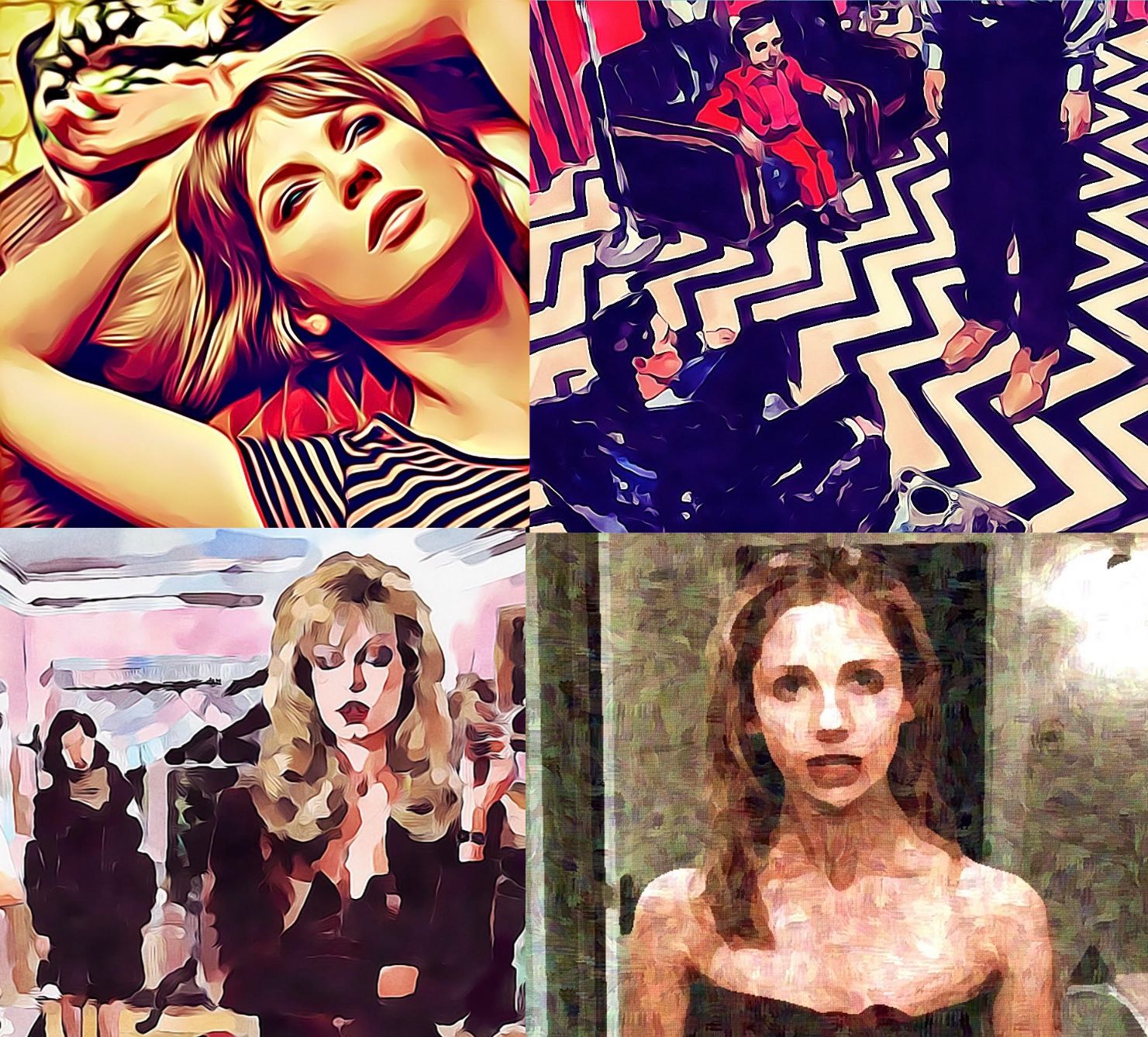


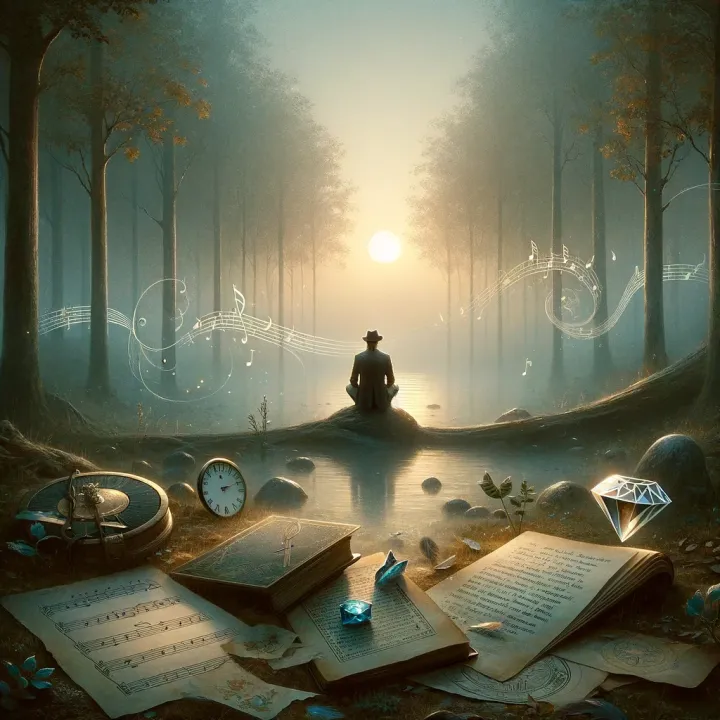
Comments ()